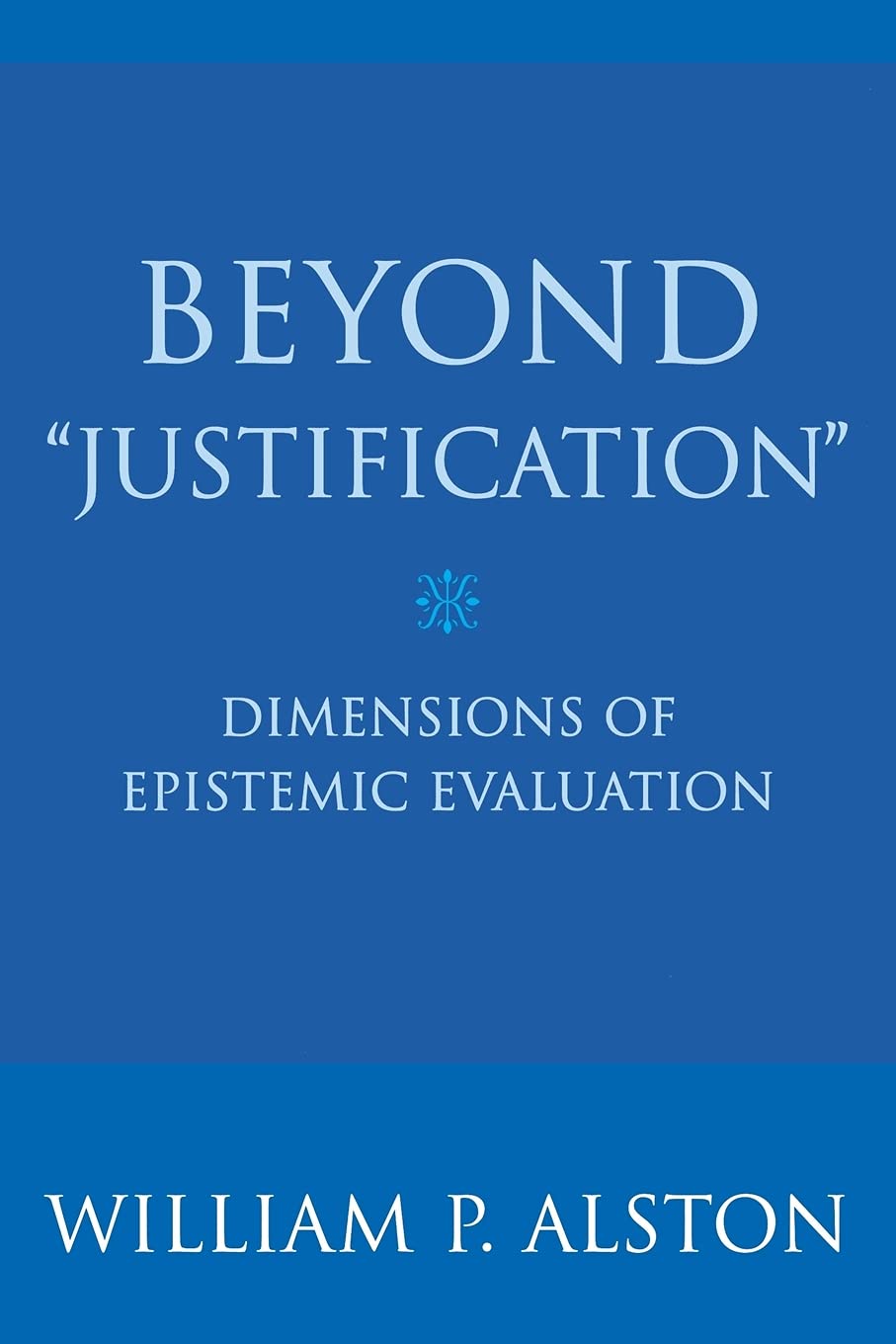
Title

Beyond 'Justification': Dimensions of Epistemic Evaluation,Used
Delivery time: 8-12 business days (International)
Much of the writing in AngloAmerican epistemology in the twentieth century focused on the conditions for beliefs being 'justified.' In a book that seeks to shift the ground of debate within theory of knowledge, William P. Alston finds that the centurylong search for a correct account of the nature and conditions of epistemic justification misses the point. Alston calls for that search to be suspended and for talk of epistemic justification to cease. He proposes instead an approach to the epistemology of belief that focuses on the evaluation of various 'epistemic desiderata' that may be satisfied by beliefs.Alston finds that features of belief that are desirable for the goals of cognition include having an adequate basis, being formed in a reliable way, and coherence within bodies of belief. In Alston's view, a belief's being based on an adequate ground and its being formed in a reliable way, though often treated as competing accounts of justification, are virtually identical. Beyond 'Justification' also contains discussions of fundamental questions about the epistemic status of principles and beliefs and appropriate responses to various kinds of skepticism.
By changing our most important processes and
products, we have already made a big leap forward. This ranges from the
increased use of more sustainable fibers to the use of more
environmentally friendly printing processes to the development of
efficient waste management in our value chain.
⚠️ WARNING (California Proposition 65):
This product may contain chemicals known to the State of California to cause cancer, birth defects, or other reproductive harm.
For more information, please visit www.P65Warnings.ca.gov.
Shipping & Returns
Shipping
We ship your order within 2–3 business days for USA deliveries and 5–8 business days for international shipments. Once your package has been dispatched from our warehouse, you'll receive an email confirmation with a tracking number, allowing you to track the status of your delivery.
Returns
To facilitate a smooth return process, a Return Authorization (RA) Number is required for all returns. Returns without a valid RA number will be declined and may incur additional fees. You can request an RA number within 15 days of the original delivery date. For more details, please refer to our Return & Refund Policy page.
Shipping & Returns
Shipping
We ship your order within 2–3 business days for USA deliveries and 5–8 business days for international shipments. Once your package has been dispatched from our warehouse, you'll receive an email confirmation with a tracking number, allowing you to track the status of your delivery.
Returns
To facilitate a smooth return process, a Return Authorization (RA) Number is required for all returns. Returns without a valid RA number will be declined and may incur additional fees. You can request an RA number within 15 days of the original delivery date. For more details, please refer to our Return & Refund Policy page.
Warranty
We provide a 2-year limited warranty, from the date of purchase for all our products.
If you believe you have received a defective product, or are experiencing any problems with your product, please contact us.
This warranty strictly does not cover damages that arose from negligence, misuse, wear and tear, or not in accordance with product instructions (dropping the product, etc.).
Warranty
We provide a 2-year limited warranty, from the date of purchase for all our products.
If you believe you have received a defective product, or are experiencing any problems with your product, please contact us.
This warranty strictly does not cover damages that arose from negligence, misuse, wear and tear, or not in accordance with product instructions (dropping the product, etc.).
Secure Payment
Your payment information is processed securely. We do not store credit card details nor have access to your credit card information.
We accept payments with :
Visa, MasterCard, American Express, Paypal, Shopify Payments, Shop Pay and more.
Secure Payment
Your payment information is processed securely. We do not store credit card details nor have access to your credit card information.
We accept payments with :
Visa, MasterCard, American Express, Paypal, Shopify Payments, Shop Pay and more.
Related Products
You may also like
Frequently Asked Questions
- Q: What is the main focus of 'Beyond "Justification"'? A: 'Beyond "Justification"' by William P. Alston shifts the debate in epistemology from the conditions of justified beliefs to an evaluation of desirable features of beliefs, proposing that the traditional search for epistemic justification is misguided.
- Q: Who is the author of this book? A: The author of 'Beyond "Justification"' is William P. Alston, a prominent figure in Anglo-American epistemology.
- Q: What topics does this book cover? A: The book addresses fundamental questions about the epistemic status of beliefs, the evaluation of epistemic desiderata, and responses to various forms of skepticism.
- Q: How many pages does the book have? A: 'Beyond "Justification"' contains 274 pages.
- Q: What is the format of this book? A: This book is available in paperback format.
- Q: When was 'Beyond "Justification"' published? A: 'Beyond "Justification"' was published on October 24, 2006.
- Q: Is this book suitable for those new to epistemology? A: Yes, while it addresses complex topics, it can be insightful for both newcomers and those familiar with epistemology, as it challenges established notions in the field.
- Q: Does the book provide practical applications of its theories? A: The book primarily focuses on theoretical discussions rather than practical applications, emphasizing the evaluation of beliefs in cognitive contexts.
- Q: What is the condition of the book? A: 'Beyond "Justification"' is listed as 'New', indicating that it is in pristine condition.
- Q: What is the significance of Alston's approach in this book? A: Alston's approach is significant as it encourages a reevaluation of traditional epistemic justification, focusing instead on the quality and coherence of beliefs, which may lead to a deeper understanding of knowledge.
